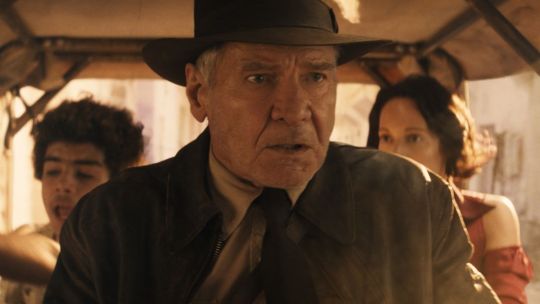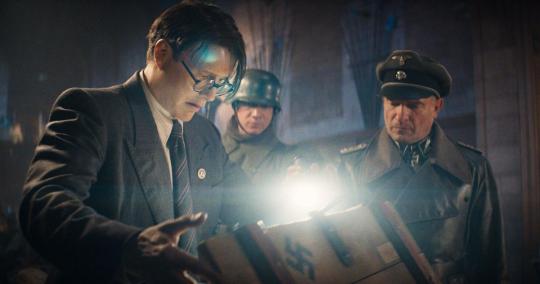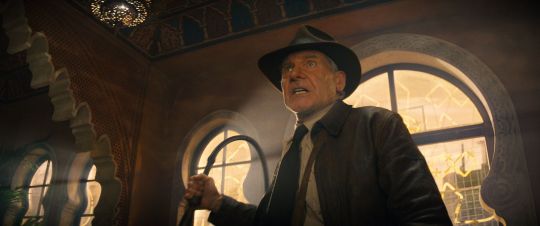#rare phoebe acknowledging Dream No More moment
Explore tagged Tumblr posts
Text

"thank you!!"
#bee draws#commissions open#hollow knight#hollow knight art#the hollow knight#hk hornet#hornet hk#rare phoebe acknowledging Dream No More moment#it's such a perfect ending that i have nothing to add#which results in me not talking about it. but it is so good
169 notes
·
View notes
Text
Indiana Jones and the Dial of Destiny: The Delicate Art of Franchise Exhumation
[The following review contains SPOILERS; YOU HAVE BEEN WARNED!]

Indiana Jones and the Dial of Destiny is all about the inexorable march of time. When we rejoin our aged protagonist in the film’s “present day” setting of 1969 (following an excessively lengthy prologue that flashes back to 1944), we discover that he has essentially been discarded by life and abandoned by the American Dream. His son is dead—a casualty of the Vietnam War. His wife, inconsolable in her grief over the loss, has filed for divorce. And on top of everything else, he’s being forced to retire from his teaching position at Hunter College. His students are too distracted by news of the recent moon landing to pay attention to his lectures; why bother researching the past when the future is now?
One notable exception to this fatalistic philosophy is Jürgen Voller, a former Nazi scientist employed by the U.S. government courtesy of Operation Paperclip. Still bitter over Germany’s defeat at the hands of the Allies, the not-so-good doktor seeks to acquire Archimedes’ Antikythera, an ancient relic rumored to be capable of literally rewriting history. Mads Mikkelsen navigates the role with aplomb, finding a surprising degree of depth in what could easily have been a flat, two-dimensional villain. No matter how suave, sophisticated, and confident he pretends to be, Voller is ultimately a feeble mathematician, not a soldier; he relies on hired muscle to fight his battles for him—because his own infrequent attempts at gunplay and fisticuffs usually result in spectacular failure.

Phoebe Waller-Bridge’s performance as Indy’s estranged goddaughter Helena Shaw is equally superb. Despite the right-wing blogosphere’s insistence that the Fleabag creator’s “woketevist” politics would ruin the movie, her character is a far cry from the girl power feminist wish fulfillment strawman that they imagined. She is neither morally nor intellectually superior to our hero—on the contrary, she is a compulsive liar and a petty thief; her greed, ambition, and opportunism consistently cause more problems than they solve. Indeed, her arc revolves entirely around gradually shedding her ruthlessly pragmatic, self-serving attitude.
At the end of the day, however, this is Harrison Ford’s show, and his (allegedly) final outing as the iconic archeologist is appropriately poignant. While the actor acknowledges the unavoidable fact of his advanced “mileage,” he wisely refuses to make it the butt of a cruel, shallow joke. Indy is no longer physically fit enough to punch his way out of every conflict, and he is slower to recover from his numerous injuries, but he nevertheless remains as cunning, resourceful, and doggedly determined as ever. But Ford’s true strength lies in his vulnerability; after decades of adventuring—plundering tombs, pummeling tyrants, and witnessing terrible miracles—Dr. Jones has accumulated a great deal of trauma. Normally, he hides his burden well, carrying himself with quiet dignity. Occasionally, though, his façade cracks, allowing the audience to briefly glimpse his repressed guilt, remorse, and regret. These rare, fleeting moments of emotional authenticity are captivatingly beautiful.

Dial of Destiny isn’t perfect, but neither is it the soulless nostalgia bait that many fans were dreading. Regardless of its structural shortcomings, it features actual themes—even John Rhys-Davies’ obligatory cameo appearance serves a clear narrative purpose. And considering the current state of the industry—corporations reducing the art of cinema to digital “content” that exists only to sell subscriptions to streaming platforms—that's got to count for something, dammit!
#Indiana Jones and the Dial of Destiny#Indiana Jones#Dial of Destiny#LucasFilm#Harrison Ford#James Mangold#Mads Mikkelsen#Phoebe Waller-Bridge#George Lucas#film#writing#movie review
3 notes
·
View notes
Text
I see a lot of posts saying that ross was meant to be like an extremely lovable character and the perfect dream guy but I really don’t think that’s what they were going for? ross is made fun of by the audience more than any other character. most of the time when another character is sad we are meant to feel sad with them. there’s always an element of funny added in but even when chandler (probably the most “comic relief” type character) is miserable abt smth we are sad for/with him. when ross is sad we’re meant to laugh at him. like his “catchphrase” if u wanna call it that is his really sad “hi” followed by a laugh track. his misery is hilarious because a) it’s hard to feel bad for him and b) he creates a lot of it himself
I mean rarely in the series are you ever supposed to actually feel bad for ross. obviously the writers think he’s a good fit for rachel for some ungodly reason and we differ in opinion there but I think for the most part ross is supposed to be an asshole. the other characters even frequently call him out on it! and at one point in the series ross even (kind of) acknowledges that really he’s only friends with these people because of monica and they’re all clearly more connected to rachel than him (when emily tells ross he can’t see rachel anymore and rachel worries abt being phased out and he says they should phase him out instead because “there are plenty of people who just see their sisters at thanksgiving and their college roommates at reunions and just see joey at burger king”) when ross does shit like freak out over ben having a barbie doll the other characters make fun of him and he’s made out to be irrational and annoying
the only times in the series you’re ever really supposed to like him all that much are the rare occasions he does something actually kind for his friends like getting phoebe a bike and teaching her how to ride because she never got to a a kid (and even then he teaches her wrong and comes off as a jerk) or when he puts aside his massive fucking ego and convinces carol that susan is the right person for her and they should get married with or without her parents, then walks her down the aisle because she has no one else. other than these few moments of genuine humanity the show presents him for the most part as an absolute asshole
#this is so long and stupid#why am I analyzing friends like this#whatever its just annoying that so many people seem to think theyre like peak intellectual bc they hate ross#the most purposefully hatable character#text#personal
36 notes
·
View notes